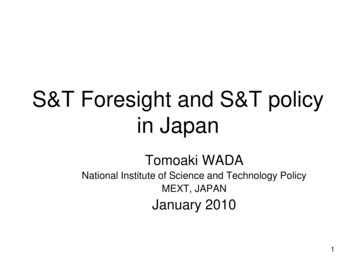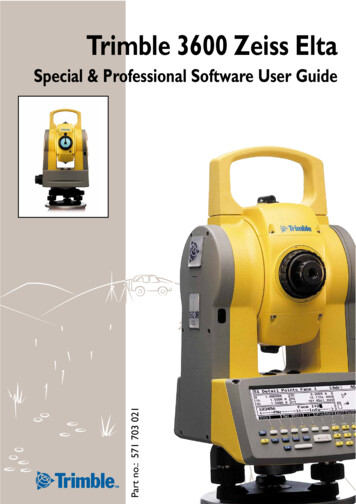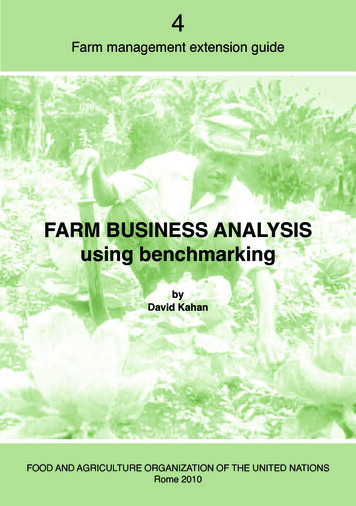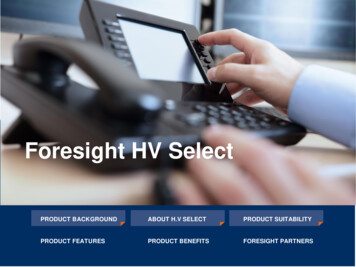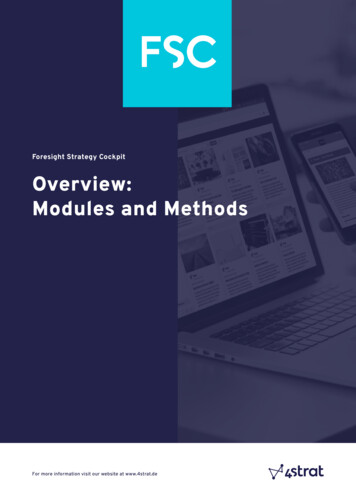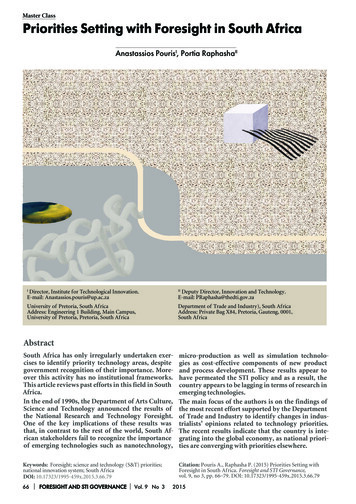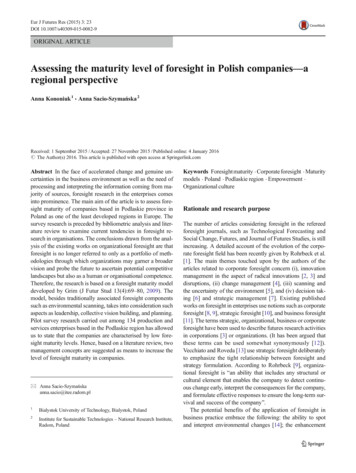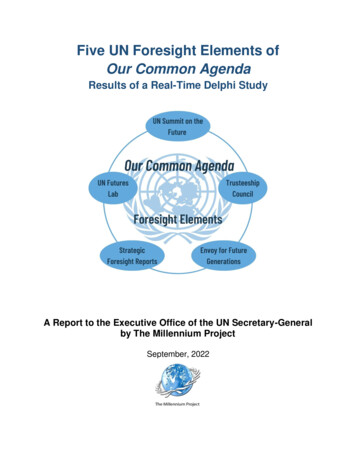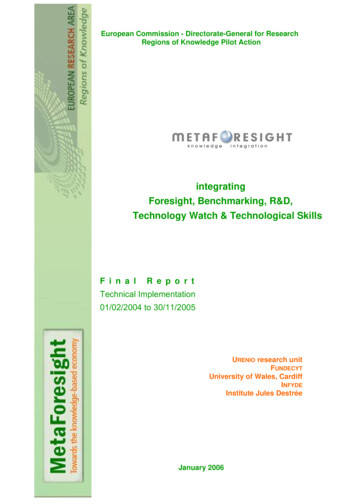
Transcription
European Commission - Directorate-General for ResearchRegions of Knowledge Pilot ActionintegratingForesight, Benchmarking, R&D,Technology Watch & Technological SkillsF i n a lR e p o r tTechnical Implementation01/02/2004 to 30/11/2005URENIO research unitFUNDECYTUniversity of Wales, CardiffINFYDEInstitute Jules DestréeJanuary 2006
REGIONS OF KNOWLEDGEM ET A- F O R E SI GH TintegratingForesight, Benchmarking, R&D,Technology Watch & Technological SkillsContentsIntroduction11. Progress of work3Activity 1 Review of existing information systems3Activity 2 Analysis of selected case studies10Activity 3 Development of Meta-Foresight model13Activity 4 Development of Meta-Foresight software application20Activity 5 Evaluation30Activity 6 Promotion/ Dissemination40Activity 7 Management502. Deliverables and results achieved523. Progress in relation to the initial plan604. Problems/ delays encountered665. Financial issues69FINAL REPORT01/02/04 to 30/11/05
REGIONS OF KNOWLEDGEM E T A - F O R E S I G H Tintegrating Foresight, Benchmarking, R&D,Technology Watch & Technological SkillsIntroductionThe Meta-Foresight project was seeking to produce an integrated information technologyapplication, aiming at enhancing regional knowledge-based capacities, and supportingregional intelligence through learning process at the regional and interregional level. In thisconcept, the heart of the project was the design and development of an integrated regionalinformation system, linking data included in different applications and information systemsand providing search capabilities. The intended integrated five fields of intelligence to aunique territorial intelligence application:(1) regional foresight, which allows the identification of regional development scenarios andanalysis of their efficiency and accordance to the existing situation for the development of aknowledge based economy in regions(2) R&D results databases, which enable the identification of the research potentiality ofregions and dissemination of the outcomes of research(3) benchmarking of regional companies and regional innovation potential and developmentpolicies, in order to identify and disseminate best practices from and to other regions(4) technology and market watch, which provides information on existing technologies andtheir possibilities, and on the products’ market demand, and(5) regional technological competences and skills.The work plan was starting from the learning process, involving survey and case studiesanalysis, proceeded to creating intelligence, through the development and testing of theintegrated Meta-Foresight model and software, and concluded with the dissemination of theresults achieved. The strategy of the project and the sequence of work packages areillustrated in figure 1:Figure 1. Meta-Foresight strategyFINAL REPORT01/02/04 to 30/11/051
REGIONS OF KNOWLEDGEM E T A - F O R E S I G H Tintegrating Foresight, Benchmarking, R&D,Technology Watch & Technological SkillsPartnership involved five organisations: two Universities and three research institutes fromfive European regions:No12345OrganisationUrban and Regional Innovation research unit (URENIO) Aristotle University of ThessalonikiFoundation for the Development of Science and Technologyin Extremadura – FUNDECYTUniversity of Wales, CardiffInformacion y Desarrollo S.L. – INFYDE S.LInstitute Jules-DestréeRegion/ countryCentral Macedonia,GreeceExtremadura, SpainWales, United KingdomBasque Country, SpainWallonia, BelgiumThe contract between the Commission and each one of the partners was signed by the endof January 2004, thus setting the starting day of the project on the 1st February 2004. Theinitial project duration was 18 months and the initial end date the 31st July 2005. However,during the evolution of the project, the work load in the activities foreseen, the delay in thedesign of the Meta-Foresight model and the strong commitment of the partnership toqualitative deliverables, forced the partnership to apply for an extension of the on(02-08-2005/RTD/M3/VK/fa/(2005)D/524867), thus the overall duration of the project has been 22months and the end date the 30th November 2005.Work has been based on inter-regional co-operation and followed a balanced distribution oftasks between partners, in order to involve all partners and benefit from collective work andsharing of views for the development and dissemination of the intended regional intelligencemodel applicable to EU regions. An excellent cooperation network has been established.The specialisation of partners in different regional development aspects provided creativeinsights for the design and the content of the Meta-Foresight model. The exchange of ideaswas the basis for such a project, which focused on the development of a new knowledgemanagement model. Co-operation was fruitful and enabled the production of new ideas,which proved useful for the core deliverable, the Meta-Foresight application. The workingteam in all partner organisations involved high scientific level and combination of views fromdifferent types of organisations: administration and regional authorities, technology watchexperts, benchmarking and r&d expertise. There has been no bias in communication andpartners delivered the work foreseen on time and with the qualitative characteristics set.In July 2004 a very sad event, the sudden loss of the excellent colleague Mr PhilippeDelavergne, shocked all the Meta-Foresight working team. The project missed a high levelexpert in regional development and knowledge management. For most partners it was alsoa loss of a good friend. Partners agreed with the suggestion of the project leader to dedicatethe Meta-Foresight project and a collective publication – the Mate-Foresight applicationguide- to the memory of Philippe Delavergne.The current report is the final technical implementation report of the Meta-Foresight project.It presents the progress made and the results achieved from the beginning of the project,February 2004, until the end, November 2005. It presents the progress on the workpackages, the results achieved, the progress in relation to the initial plan, the difficultiesfaced during the implementation and the financial issues involved. The final report integratesinformation provided by each partner and reflects the overall efforts of the consortium.The final report is accompanied with all the deliverables produced during the evolution of theproject.FINAL REPORT01/02/04 to 30/11/052
REGIONS OF KNOWLEDGEM E T A - F O R E S I G H Tintegrating Foresight, Benchmarking, R&D,Technology Watch & Technological Skills1Progress of workIn general, the project evolved according to the work plan. All activities foreseen in thecontract were undertaken and accomplished during the project duration:(1) survey on existing applications dealing with foresight, benchmarking, r&d, technologywatch and technological skills,(2) analysis of 5 case studies -one per partner,(3) design of the Meta-Foresight model,(4) development of the Meta-Foresight software(5) project evaluation and testing of the software(6) dissemination actions (webs, promotion leaflets, Meta-Foresight application guide, finalconference)(7) management of the consortium activities.In addition, three technical meetings, not foreseen in the initial work programme, were held,in order to facilitate decision making on specific issues. The project progressed efficiently, interms of management and evolution of work packages and deliverables.Specifically, the activities accomplished during the project are analysed below.REGIONS OF KNOWLEDGE PROJECTS KICK-OFF WORKSHOP, 27 FEBRUARY 2004, BRUSSELSThe programme was represented to the meeting by Ms Lina Kyrgiafini, for the coordinator –URENIO research unit, and Mr Philippe Destatte, for partner 5 – Institute Jules Destrée. Theparticipation of Mr Martin Rhisiart was cancelled, due to flight cancellation. The meetingoffered the possibility to review the overall orientation and the objectives of the Regions ofKnowledge programme, exchange ideas with the other projects of the pilot action,incorporate the views of the Commission in the project activities, and clarify managerialissues. The meeting was also an opportunity to present the Meta-Foresight concept and themilestones of the work plan to the KnowReg secretariat and the representatives of the otherprojects. The proceedings of the meeting and all the documents distributed by the KnowRegsecretariat were communicated to the Meta-Foresight partners.ACTIVITY 1 REVIEW OF EXISTING INFORMATION SYSTEMSMain objectives of the activity have been the deepening of partners’ knowledge on theimplementation of foresight, benchmarking, r&d results demonstration, technology watch,and applications for the codification, categorisation and presentation of technology skills,and the learning from the experiences of other EU regions on the application ofcorresponding information systems: specifications, technical requirements, resources,methodologies, etc. The activity included two distinct tasks: the organisation of the kick-offmeeting and the survey on existing information technology applications dealing withforesight, benchmarking, R&D, technology watch and technological skills.FINAL REPORT01/02/04 to 30/11/053
REGIONS OF KNOWLEDGEM E T A - F O R E S I G H Tintegrating Foresight, Benchmarking, R&D,Technology Watch & Technological SkillsD1Kick-off meetingThe kick-off meeting took place on the 16th March 2004, in Thessaloniki, at the premises ofURENIO research unit. The agenda of the meeting included: (1) the analysis of the concept ofthe Meta-Foresight project, (2) the description of work packages and deliverables, and (3)the presentation of the management rules of the project. In the meeting participated 10persons, representing the five partner organisations:URENIO research unitFUNDECYTUniversity of Wales, CardiffINFYDEInstitute Jules DestréeNicos KomninosLina KyrgiafiniElena SefertziMaria Martin EdigoLuis Casas LuengoYiannis PierrakisBelen BarroetaCarlos Rivera AlemanPhilippe DelavergnePascale Van DorenDuring the first session, Dr Nicos Komninos presented the concept of the Meta-Foresightproject, with emphasis on existing information systems fostering the creation of regionalknowledge. This raised the discussion on the focus of the Meta-Foresight application: thetarget groups that will be involved, the output of the application, the ways independentmodules will be combined to provide the output.The second session concerned the distribution of work among partners and the analysis ofactivities and deliverables. For each task of the work plan was presented: the objective, theimplementation procedure, the responsibilities of partners, the time schedule, and thedistribution of budget among partners. Partners discussed each task and deliverable andprovided fruitful insights for the evolution of the project. A number of small modifications,concerning mainly the time of delivery of certain results, have been made to the initial workplan, with the agreement of all partners. Partners reorganised the project, set thespecifications of work for the whole project, decided to hold a technical meeting in July2004, in order to set the specifications for the Meta-Foresight model.The third session covered management issues. The project implementation requirementswere discussed, based on the presentation made by Keith Sequeira during the KnowREGkick-off meeting of 27th February, and covered: contract overview, technical and financialreporting obligations, payment procedures, deliverables and outputs. Partners obtained aclear view of their contractual obligations and the managerial requirements for the project.D2Survey on existing information systems developed under projects of theInnovative Actions ProgrammeThe objective of the survey was to list and codify approaches related to the concept and thetechnical aspects for the application of information systems for foresight, r&d,benchmarking, technology watch and technological skills. The initial plan was foreseeing toinvestigate projects developed under the Innovative Actions programme of the EU, butduring the kick-off meeting, partners decided to broaden their search and includeapplications over the EU and USA. Partners conducted the survey according to theFINAL REPORT01/02/04 to 30/11/054
REGIONS OF KNOWLEDGEM E T A - F O R E S I G H Tintegrating Foresight, Benchmarking, R&D,Technology Watch & Technological Skillsspecifications and based on published data. Each partner undertook to conduct the surveyin one thematic area:URENIO: Technological SkillsFUNDECYT: Technology WatchUniversity of Wales – Cardiff Business School: BenchmarkingINFYDE: R&DInstitute Jules Destrée: ForesightThe results of each survey were included in a report, which, apart from the description of theselected applications, provides useful insights to the content of the Meta-Foresight model.For each application identified, the following information is provided:URENIO general features: region where the project has run, objectives, partnership intelligence creation methodology (foresight, benchmarking, etc.) supporting information system key results and transferability contribution to the development of the Meta-Foresight modelThe problematic of the survey on technological skills covered two directions: the firstdirection was the identification of the conceptual aspects involved in “technologicalskills”: learning opportunities, education, certification of qualifications, existing qualificationswithin regions, employment, job vacancies, employers’ needs for specific qualifications etc.The second direction concerned the information technology part of the existing applications.Combining these two axes, the survey on information systems for technological skills wasbased on Internet search, given that the Meta-Foresight application would be provided online. The survey was initially focused on projects run under EU calls, but given that only afew such projects were found, the survey was re-oriented to applications available on theweb, providing information on human resources. The investigation covered specific knownaddresses and agents (European Commission, Universities, professional chambers, etc.)and search in general search engines available on the web (google, yahoo, etc.). Theidentified applications were listed and codified and then a second elaboration and deepersearch was conducted, in order to identify the more indicative and adequate applications forthe Meta-Foresight project. Based on criteria related to the concept, the quality ofinformation and output, the transferability, and the accessibility of the applications, thesurvey concluded to 32 applications dealing with technological skills aspects. Four caseswere selected out of the 32 applications and were further analysed:(1) the human resources section of the comprehensive portal Madri d (www.madrimasd.org) performs matching of companies needs for high qualified personnelwith the supply of technological skills, and provides a series of services enablingcompanies to ameliorate their business performance and professionals to orient theirjob careers. The software platform used is easily accessible, friendly structured andadaptable.(2) the European Job Mobility portal (europa.eu.int/eures/) focuses on the whole EU areaand provides information, services and database search for several aspects relating to‘technological skills’: mobility of workers, job finding and job recruiting, living andFINAL REPORT01/02/04 to 30/11/055
REGIONS OF KNOWLEDGEM E T A - F O R E S I G H Tintegrating Foresight, Benchmarking, R&D,Technology Watch & Technological Skillsworking conditions and learning opportunities across Europe - regional approach. Themultifunctional approach and the combination of several services fit to the integratedscope of the Meta-Foresight model.(3) the European Job Guide (www.european-jobguide.org) is a project run by aconsortium of European organisations offering services to professionals in foursectors: health care, tourism, IT/high tech, and metalworking/ electrotechnics. Itfocuses on the reinforcement of their mobility opportunities by providing interactiveservices concerning vocational training, working conditions and professionalorganisations in the countries of the consortium members.(4) the on-line database of engineers on the technical Chamber of Greece (www.tee.gr)provides search within an alphabetical listing of engineers and technical companies ofGreece.The results of the survey were recorded in a report, which included the description of thebasic features of the 32 applications and more detailed presentation of the 4 selected cases.FUNDECYTThe survey on Technology/ Market Watch examined different theoretical approachesand was based on data published on the Internet, promotion material and publicationsproduced by the coordinators of the initiatives. The results of the survey were included in areport listing different initiatives that have been launched in European regions, and trying topresent a general overview of the variety of services that are provided within the so called“Technology Watch services”, from the advanced to the basic ones. The survey andanalysis were focused on four applications:(1) technology watch service of the Madri d portal (www.madrimasd.org). TheTechnology Watch services are provided through innovation circles aiming to assistcompanies with the initiation and development of technology watch and economicintelligence activities, and promote cooperation between companies and researchcentres and groups. The innovation circles currently encompass the following areas:Agro-food, Biotechnology, Production Materials and Technology, InformationTechnology and Communications, Environment, Microsystems and Nanotechnology,and Energy.(2) Pasaia Observatory (www.observatoriopasaia.com) was a multi-service internet web,whose main objective was to be a useful tool for industrial companies in the PasaiaRegion, Basque Country providing information of interest to the companiesthemselves and contributing to publicising the enormous industrial potential offered bythe Zone.(3) South West of England Regional Development Agency (www.southwestrda.org.uk)uses the Automated Matching Tool of the IRC as a free technology watch service. Byemail they inform the companies about the technological developments and requestsfor technological solutions from business and research centres throughout Europe.(4) technology watch service of the Montage project (www.montage.org.uk) assistsbusinesses by searching a range of world wide information sources to identify specifictechnologies, materials, research expertise, development facilities, etc., to meet theunique needs of each client. The service offered is either for a "one off" search or a"subscription" based on the continuous update of a chosen subject.FINAL REPORT01/02/04 to 30/11/056
REGIONS OF KNOWLEDGEM E T A - F O R E S I G H Tintegrating Foresight, Benchmarking, R&D,Technology Watch & Technological SkillsUNIVERSITYOF WALESA large number of benchmarking applications were known to the project team at CardiffBusiness School at the inception of the project – through discussions within conferencesand various professional contacts. Collectively, these applications formed a substantialbody of benchmarking knowledge and experience. To supplement existing knowledge,desk-based research was undertaken to identify other relevant applications for the purposesof this survey. Many applications were identified in the course of this research phase.Having identified a range of benchmarking applications, they were categorised into types ofapplications and graded according to their potential contribution to the project. A typology ofBenchmarking applications was identified, consisting of Organisational Benchmarking(appropriate for companies), Thematic Benchmarking (appropriate for economic sectors)and Spatial/territorial Benchmarking (appropriate for regions). A total of 6 specificapplications were described and analysed, following a period of identification and research:(1) UK Benchmarking Index is arguably the world's most extensive benchmarkingresource for businesses. Its aim is simple - to help businesses to improve theircompetitiveness and profitability. Run by the Small Business Service (UK Departmentof Trade and Industry) and delivered exclusively via trained advisors, theBenchmarking Index holds the financial data of over 156,000 companies and has adatabase of benchmarked performance data for a further 5,000.(2) PROBE - PROmoting Business Excellence is a suite of diagnostic and best practicebenchmarking tools. Developed by the CBI (Confederation of British Industry) inconjunction with industry leaders and leading academics, the PROBE tools help CBImembers gain and sustain the edge in today's highly competitive markets. There arefour PROBE tools, one of which has been specifically designed for manufacturers.The other three deal with three key business areas: CONTOUR covers environment,health and safety management; HEADSTART covers all aspects of peoplemanagement and the final tool covers service excellence.(3) EURBEST – European Union Region Benchmarking, Economic Strategy and Transfer projectbrings together 28 partners from a wide geographical spread of regions in Europe. The focus ofthe project is to produce transfer tools, methodologies and procedures to enable any region thatwishes to transfer best practice from an exemplar region into their own region to do so.(4) European Innovation Scoreboard was developed at the request of the Lisbon European Councilin 2000. It focuses on high-tech innovation and provides indicators for tracking the EU’sprogress towards the Lisbon goal of becoming the most competitive and dynamic knowledgebased economy in the world within the next decade.(5) BISER – Benchmarking the Information Society: e-Europe indicators for European Regions.The BISER project has defined, developed and piloted a set of statistical indicators forbenchmarking the progress of European regions in respect of the e-Europe initiative and theemerging Information Society.(6) SCEnE project, Sustainability for Organisations: A Guide to Best Practice in Wales.The main aim of the project was to identify and measure best practice in SustainableDevelopment, the SCEnE project (University of Wales, Bangor) has developed asustainability appraisal tool. Through extensive desktop based literature reviewfocused on relevant SD related publications, policy initiatives and research such asthe Global Reporting Initiative (GRI), the project team were able to map out the majorissues relevant to all aspects of SD. A primary outcome of the project is a practicalFINAL REPORT01/02/04 to 30/11/057
REGIONS OF KNOWLEDGEM E T A - F O R E S I G H Tintegrating Foresight, Benchmarking, R&D,Technology Watch & Technological Skills“Sustainable Development Appraisal Tool-kit”, which can assist individualorganisations in mapping their performance in terms of sustainability. A secondaryoutcome of this project is a user-friendly “best-practice” guide. The guide provides auseful source of information, including clear examples and “how-to” guidelines, for avariety of organisations wanting to move towards sustainable development and inplanning their own sustainability strategies.In addition to covering the main background, aims and content of the applications, the reporton the survey discussed the transferability potential of the different approaches.INFYDEThe approaches related to the concept and technical aspects for the application ofinformation systems for R&D in the European Union and the United States, were listedand decoded. The survey tried to identify the different types of R&D and supportinfrastructures, such as Foundations and Chambers of Commerce, as well as UniversityCentres and associations of public services. The different types of R&D are covered:technology transfer, R&D management, R&D policy and high tech. Seven applications havebeen selected:(1) the R&D section of the Madri d portal provides information on current research,development and innovation news in Spain with national and European contents, freeof charge and with free access to all users. It also offers a series of indicators thatallow to view, evaluate, and pursue the state-of-the-art concerning the research andinnovation system of the Community of Madrid.(2) Steinbeis Foundation in Baden-Württemberg region provides an extensive range ofservices to SMEs including target-oriented advice on technologies and markets, awide range of information and further training measures, and implementation andtransfer of concrete research and development projects.(3) Usix Tekes in Finland comprises R&D projects involving major Finnish companies andresearch institutions. There are also working groups and seminars dealing with keyprogramme areas, and a number of publications on the results of the R&Dprogrammes. Moreover, the programme provides an excellent opportunity to pilot ITapplications, services and contents in collaboration with participants. Knowledgemanagement and availability methods are the common denominators for all researchareas of Usix.(4) Arist in Rhone –Alpes region builds a space of reference between experts from thepublic and the private sector on technological issues concerning innovation, skills andexchange of know-how.(5) Association of Regional Observatories in England represents a meta observatory ofregional intelligence in UK. The principal aim of ARO is to promote the provision anduse of the best intelligence and data for UK’s regions.(6) Centre for Economic development Carnegie Mellon Pittsburgh region, US providesstrategic and policy support for technology and economic development. Servicesinclude technical assistance in policy and strategy to guide action, economic analysisand modelling, mapping, benchmarking, and timely analysis of key issues.(7) Joint Venture: Silicon Valley Network in Silicon Valley Region, US mobilises peoplefrom businesses, employees, government, education, and all segments of theFINAL REPORT01/02/04 to 30/11/058
REGIONS OF KNOWLEDGEM E T A - F O R E S I G H Tintegrating Foresight, Benchmarking, R&D,Technology Watch & Technological Skillscommunity in order to identify regional issues to sustain the innovative economy, toincrease the productivity and broad prosperity.The methodology followed to identify Foresight applications suitable to the MetaForesight project combined observations both at European and regional levels that allsupport the idea that regional foresight is still new to be really considered as astructured and well integrated tool in the decision making process. In that perspective, onemain goal of the survey was to valorise the contribution in the Meta-Foresight project as“intelligent intermediary” to organize a constructive interaction between the productdevelopment process (Meta-Foresight application) and the regional field with all effortsdeveloped in foresight on a non convergent approach. Four cases have been selectedaccording to four specific areas of intelligence and criteria:INSTITUTEJULES-DESTRÉE- Foresight and innovation strategy in the regions- Geographical information systems as foresight tool for public decision makers- New issues linked to Knowledge Society development- Updated indicators to measure performance of the Knowledge RegionsThe identified applications are:(1) Project Prométhée I and II (Wallonia): development of a foresight programme tostructure a better knowledge of the innovation potential of the region (SWOT andmapping of innovation in the region, including technology forecasting), stimulatepartnerships and synergies to launch clusters and organise a supply network torespond to firms needs and create a favourable environment for innovation in theregion.(2) RIS Limburg (The Netherlands): development and application of a set of intelligencesupport instruments to support the regional innovation vision/strategy of Limburg: (1) amanual providing a practical outline of the techniques used by consultants (Delphi,road mapping, Porter, SWOT, benchmarking, etc.); (2) Technology foresight study(identification of 15 key-technologies for the region) and dissemination of resultsamong SMEs; (3) 3 complementary monitoring systems that contribute to set out aneffective and efficient policy of innovation to assess the impact of innovationpromotion measures at the company level, impacts of individual projects of innovationand the overall impact at regional level.(3) SIGALE project accumulates, analyses and disseminates geographical informationuseful for the planning, the follow-up and the assessment of regional policies and forthe diagnosis, analysis and forecast of spatial evolution with the aim to promote asustainable development.(4) SEEL (Supporting Excellence in e-Learning) project combines analysis andassessment of current e-learning practices, the production of tools andrecommendations to promote best practice, and ongoing and public dissemination ofthe outcomes of the project (benchmarking tools, quality guidelines, quality centres).The five reports were elaborated and consolidated in a comprehensive report, which, isstructured on the five chapters each one targeted to one thematic field: foresight,benchmarking, r&d, technology watch, and technological skills. The chapters of theconsolidated report follow the same specifications, but there are some minor differences,FINAL REPORT01/02/04 to 30/11/059
REGIONS OF KNOWLEDGEM E T A - F O R E S I G H Tintegrating Foresight, Benchmarking, R&D,Technology Watch & Technological Skillsdue to conceptual issues involved in each thematic and approaches followed by thepartners. Work on the survey and the reporting lasted for two months, from March to April2004, according to the time schedule. The consolidate
(1) survey on existing applications dealing with foresight, benchmarking, r&d, technology watch and technological skills, (2) analysis of 5 case studies -one per partner, (3) design of the Meta-Foresight model, (4) development of the Meta-Foresight software (5) project evaluation and testing of the software
